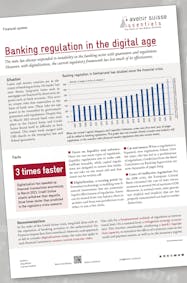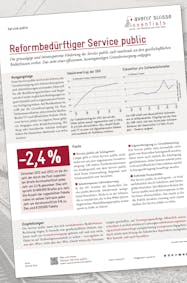If one sector in Switzerland is growing particularly fast, it’s red tape. Each year, an additional 7,000 pages of new requirements – or a stunning 140 pages a week – are added to the federal rule book. And that’s excluding all the separate measures coming from individual cantons and municipalities, not to mention feverishly active regulators like Finma (financial markets), ElCom (electricity), or the Competition Commission.
Even politicians acknowledge something must be done because the flood of regulation represents a real threat to Switzerland’s competitiveness. While the country continues to shine in many international rankings of attractiveness as an investment location, the trend for some time has been downwards. The World’s Bank’s widely followed “Doing Business Index” for example shows Switzerland falling from 11th in 2005 to 29th this year.
Attempts to stem the regulatory tide have so far proved ineffective. A regulatory reassessment, introduced under the revision of the federal constitution, is little more than a paper tiger and has been shown to be of limited practical value. Three factors explain why new rules and regulations keep coming. First, there is an inherent conflict of interest: bureaucrats abolishing rules risk putting themselves out of business. Secondly, globalisation has boosted the regulatory burden via ever more international treaties. And thirdly, for companies, regulations can actually be a blessing in disguise by creating additional barriers to new entrants.
Avenir Suisse’s discussion paper, written by senior consultant Peter Buomberger. proposes some practical measures – partly proven already in other countries – to tackle the regulatory fever. The top three are:
- A preliminary regulatory “Quality Check.” The impact of new regulations in Switzerland is often assessed relatively late, via elaborate and expensive means. Introducing an early, simple, and standardised cost benefit analysis, in the form of a “Quality Check”, would help greatly
- An independent assessment unit. Entrusting quality checks to an independent team would avoid bureaucratic conflicts of interest. The Netherlands has already moved in this direction with its Actal independent evaluation office. Britain, Sweden and Germany have similar set ups.
- Introducing a “regulatory brake.” Switzerland’s so called “debt brake” on government borrowing has long proved its worth as an automatic, institutionalised tool In the same vein, ceilings could be put on the amount of new rules being implemented and limits defined on the extra administrative burden on companies.
Swiss businesses face many challenges, including relations with key trading partners, geopolitical uncertainties or the strong franc, which are out of their control. All the more important, therefore, to prioritise something like regulation, where Switzerland itself can hone its competitive edge. Such changes would, at least, mean new measures like the 2050 Energy Strategy, the new immigration curbs or the Fidleg financial rules could be implemented as efficiently as possible.




